Politics
/ArcaMax
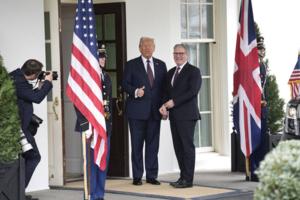
PM Starmer vows steps to bolster UK against Trump tariff threat
UK Prime Minister Keir Starmer said he’ll announce measures this week to support Britain’s economy and businesses amid the threat posed by Donald Trump’s tariffs.
Writing in the Telegraph, Starmer said, “The world as we knew it has gone. We must rise to meet the moment.”
The U.S. president last week announced sweeping global tariffs...Read more
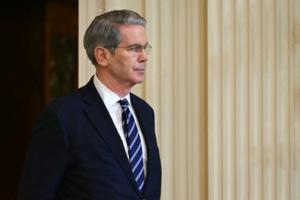
Bessent defiant on tariffs as he rejects a US recession
U.S. Treasury Secretary Scott Bessent on Sunday struck a defiant tone in the face of global financial markets selling off sharply in response to new U.S. tariffs, arguing the duties were necessary and rejecting the idea that they would cause a U.S. recession.
“I see no reason that we have to price in a recession,” Bessent told NBC’s "...Read more
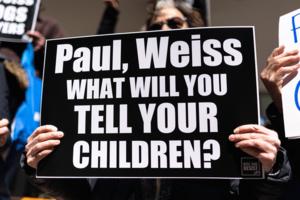
Commentary: Big law must stop caving to Trump's demands
Big law firms that have offended President Donald Trump for representing a cause or client he doesn’t like are being forced to make a choice: Either cut a deal with him to protect their billion-dollar businesses, or sue him to assert their right to continue representing clients as they please.
It was extremely disappointing when Paul, Weiss, ...Read more
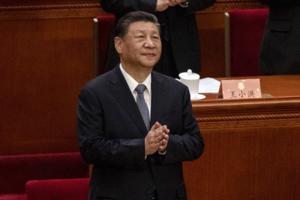
China pledges resolute measures to hit back at Trump tariffs
China pledged decisive action to defend its economy, a day after unveiling levies on American goods and export controls on rare earths in response to Donald Trump’s tariffs.
Beijing will continue to take “resolute measures” to safeguard its sovereignty, security and other interests, the state-owned Xinhua News Agency reported on Saturday....Read more

Collectors feel relief as classic cars evade Trump's auto tariffs
President Donald Trump’s sweeping tariff plan has rocked global markets, with every single sector in the S&P 500 ending Friday in deep red. But one turgid addendum issued by U.S. Customs and Border Protection just after his April 2 tariff pronouncement provided relief for those in the collectible car business: Vintage cars would be exempt.
...Read more
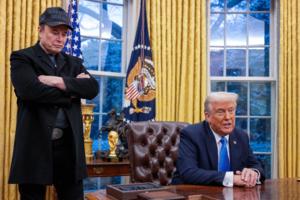
Musk hopes US, Europe move to zero-tariff free-trade zone
Elon Musk hopes for a “zero-tariff” system between the U.S. and Europe that would effectively create “a free-trade zone,” he said on Saturday, days after levies set by U.S. President Donald Trump sent global markets into a tailspin.
“Both Europe and the United States should move, ideally, in my view, to a zero-tariff situation, ...Read more

Anti-Trump, Musk protests kick off around the nation
LOS ANGELES — Tens of thousands of people took to the streets across the country on Saturday to protest President Donald Trump and a wide range of his administration’s actions, including government downsizing, attacks on the rights of immigrants and transgender people, and tariffs that are roiling economies across the globe.
More than 500,...Read more

Wall Street gets rude shock as Bessent plays second fiddle on tariffs
WASHINGTON — From the moment President Donald Trump unveiled his sweeping tariffs Wednesday through the ensuing market mayhem the following day, Treasury Secretary Scott Bessent’s phone lit up with text messages from executives tied to his former industry.
Multiple hedge fund managers and finance executives reached out, seeking his help in ...Read more

Anti-Trump, Musk protests kick off around the nation
LOS ANGELES — Tens of thousands of people took to the streets across the country on Saturday to protest President Trump and a wide range of his administration’s actions, including government downsizing, attacks on the rights of immigrants and transgender people, and tariffs that are roiling economies across the globe.
More than 500,000 ...Read more
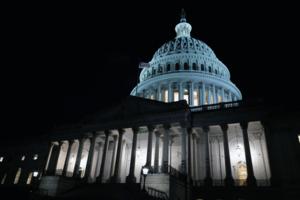
Trump tax cut, debt limit plan advances amid tariff turmoil
Senate Republicans took a major step toward enacting President Donald Trump’s tax cut agenda and increasing the U.S. debt ceiling, potentially injecting a small degree of certainty into financial markets roiled by the president’s tariff policies.
The Senate early Saturday morning passed the budget resolution by a 51-48 margin after an ...Read more
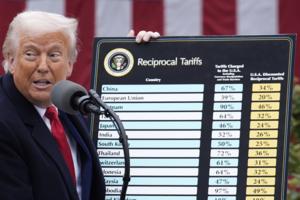
Trump promised a manufacturing boom. Industries are not so sure
President Donald Trump has vowed his historic tariff blitz would revive domestic manufacturing, but industry worries about his approach are raising fresh doubts about whether he can deliver on his promise of an economic boom.
In the Rose Garden on Wednesday, Trump declared “jobs and factories will come roaring back into our country” and ...Read more
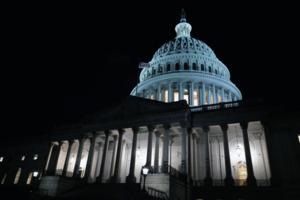
Trump tax cut, debt limit plan advances amid tariff turmoil
Senate Republicans took a major step toward enacting President Donald Trump’s tax cut agenda and increasing the U.S. debt ceiling, potentially injecting a small degree of certainty into financial markets roiled by the president’s tariff policies.
The Senate early Saturday morning passed the budget resolution by a 51-48 margin after an ...Read more

'Nowhere to hide.' How Apple and others in Silicon Valley are bracing for Trump tariffs
SAN FRANCISCO — The iPhone is a quintessentially 21st century product — Californian in its creation and design and now enmeshed in the global economy.
Apple makes most of its iPhones in China, though in recent years the Cupertino-based company has made more of its products in India, Vietnam and other nations. In all, the tech giant says it...Read more
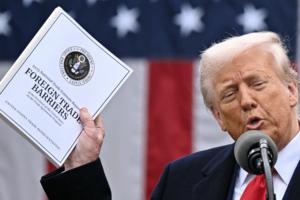
Commentary: President Donald Trump's tariffs will cost us
As President Donald Trump laid out his case for sweeping new tariffs, it sounded reasonable. He was only imposing on other countries the burden they impose on us. Those tariffs, he said, would boost our national revenue and decrease our deficit. He recalled a wealthy America 150 years ago funded entirely by tariffs instead of a pesky income tax,...Read more

Editorial: America just dumped the world. New loves will be forthcoming
As antacid-chugging Americans watched their portfolios and retirement account balances drop Thursday, it was easy to forget another consequence of Donald Trump’s ill-considered splaying the day before of new U.S. tariffs on nations large, small and uninhabited.
The likelihood of this nation losing its role as a global leader, leadership being...Read more

Indiscriminate tariffs threaten rest of Trump's agenda
Not yet three months into a second term, President Donald Trump has taken difficult, but necessary, actions to rein in the scope of a federal government on a fiscally unsustainable path. He is also working with Republicans in Congress to extend his 2017 tax cut bill, allowing Americans to keep more of their own money. These are positive steps.
...Read more
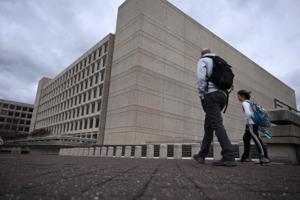
Trump team proposes ending Office of Clean Energy, cutting billions
WASHINGTON — The U.S. Energy Department is proposing to shut down its Office of Clean Energy Demonstrations and cut roughly $9 billion in awards for programs regarding carbon capture, direct air capture, solar and hydrogen, according to documents seen by Bloomberg.
Under the plan, which isn’t final, the $27 billion agency’s staff would ...Read more
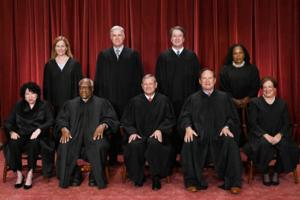
Supreme Court OKs Trump's cuts to teacher training grants
WASHINGTON — The Supreme Court ruled for the Trump administration on Friday and lifted a judge’s order that had blocked the canceling of $148 million in grants for recruiting and training new teachers nationwide.
By a 5-4 vote, the justices granted the administration’s appeal and freezes the funding for now.
Chief Justice John G. ...Read more

Bayer asks high court to take $1.25 million Roundup appeal
Bayer AG said it’s seeking a U.S. Supreme Court review of litigation over the weedkiller Roundup, its latest effort to get beyond a mountain of legal woes.
The German conglomerate asked the high court Friday to take its appeal of a 2023 verdict from a St. Louis trial in which a jury ordered Bayer’s Monsanto unit to pay $1.25 million in ...Read more

Markets devastated as recession fears grow over Trump tariff plan
WASHINGTON — A second day of market devastation shook Washington on Friday, vanishing more than $5 trillion in value in one of the largest 48-hour losses on record — an extraordinary rout caused not by pandemic, war, terrorism or bank failure, but by policy set by the American president.
The policy, announced by President Donald Trump on ...Read more
Popular Stories
- Indiscriminate tariffs threaten rest of Trump's agenda
- Commentary: President Donald Trump's tariffs will cost us
- Editorial: America just dumped the world. New loves will be forthcoming
- Wall Street gets rude shock as Bessent plays second fiddle on tariffs
- Commentary: Big law must stop caving to Trump's demands


























































